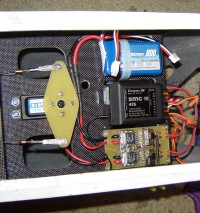PowerSafe : A dual regulated power supply for plane models

Plane models, whether they are gas or electric powered, always rely on a 100% electrical transmission channel.Usually, the RF receiver and servomotors are powered by a 4,8-6V voltage supplied by a 4 or 5 cells NiMH battery. They are also switched on/off by a mechanical 2 positions switch inserted in series with one pole of the battery.
Plane models, whether they are gas or electric powered, always rely on a 100% electrical transmission channel.
Usually, the RF receiver and servomotors are powered by a 4,8-6V voltage supplied by a 4 or 5 cells NiMH battery. They are also switched on/off by a mechanical 2 positions switch inserted in series with one pole of the battery.
Even if this kind of -simple- supply has been widely used, it suffers of many disadvantages :
- NiMH batteries are heavier than Lithium ones (and weight is the first ennemy in plane models)
- NiMH batteries suffer of self-discharge and "memory effect"
- All the plane life relies on ONE battery pack and ONE mechanical switch exposed to exhaust fumes and vibrations.
I crashed a plane a few years ago after one cell of my NiMH battery pack decided to stop working by increasing its internal resistance. All the servos then went awfully slow and plane became uncontrollable. Collision with the floor was then unavoidable.
The technical requirements of my new projects were then obvious :
- Dual power supply chain to avoid battery failure
- Dual "Inverted" switch to avoid mechanical failure of this part.they are opened in normal operation and closed in shutdown, that avoids false contacts during flight.
- Dual Regulated supply to allow the use of 7,4V Lithium batteries with conventional 5V receivers and servos.
- Dual identical batteries supplying the same current instead of a main/spare battery topology. Both supply channels delivers the same current to the receiver, doubling the capacity available.
A few hours of schematics, layout, prototype realisation, and POWERSAFE was ready to fly ! This project was designed in 2009 and spent around 20 hours in the airs on a 2m pattern plane, without any problem !
Now time has come to share this project with elektor's readers. Hope you'll enjoy it !



Discussion (0 comments)